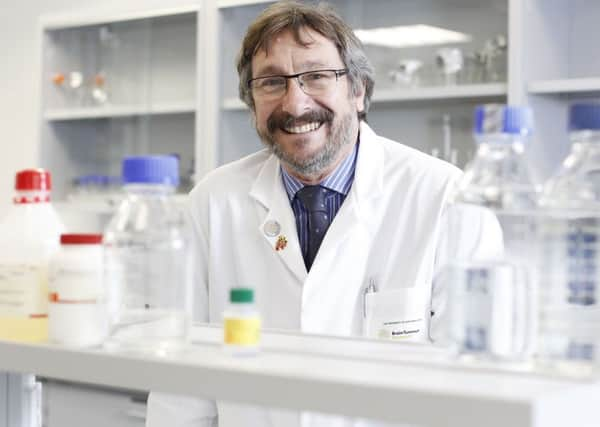Breakthrough in brain tumour research by Milton Keynes charity


Prof. Geoff Pilkington and Dr Richard Hill, from Shenley Wood-based charity Brain Tumour Research’s Centre of Excellence at the University of Portsmouth, presented their research findings at the conference “Brain Tumours 2016 – From Biology to Therapy.”
Their group has been collaborating with Innovate Pharmaceuticals who have developed a novel formulation “IP1867B”, combining reformulated aspirin with two additional ingredients, into a soluble form.
Advertisement
Hide AdAdvertisement
Hide AdDeveloping a true liquid aspirin has long been a scientific goal, as “soluble” aspirins currently on the market are not completely soluble and still contain grains that cause gastric side effects.
Most significantly for patients with brain tumours, this new formulation significantly increases the ability of drugs to cross the blood brain barrier. This membrane serves to protect the brain but also blocks many conventional cancer drugs from reaching brain tumours. This research suggests that Innovate Pharmaceutical’s IP1867B could be highly effective against glioblastoma (GBM), one of the most aggressive forms of the disease, which kills thousands of patients within a year.
The breakthrough came in laboratory tests on cancer cells from adults and children with brain tumours. In all the variations of drugs tested, including separating out the three key components of IP1867B, it was ten times more effective than any combination of other currently used drugs.
“This is a potential game-changer for research into brain tumours and clearly shows what sustainable research is able to achieve,” said Sue Farrington Smith, Chief Executive of Brain Tumour Research.
Advertisement
Hide AdAdvertisement
Hide Ad“It is science like this that will enable us to eventually find a cure for this devastating disease which kills more children and adults under the age of 40 than any other cancer.”
All three ingredients, which are already approved for use in the clinic, have been shown to kill tumour cells without having an effect on normal brain cells. Although the drug will now be further developed in pre-clinical models, more research will be needed before findings show whether it will be suitable for patients in clinical trials.